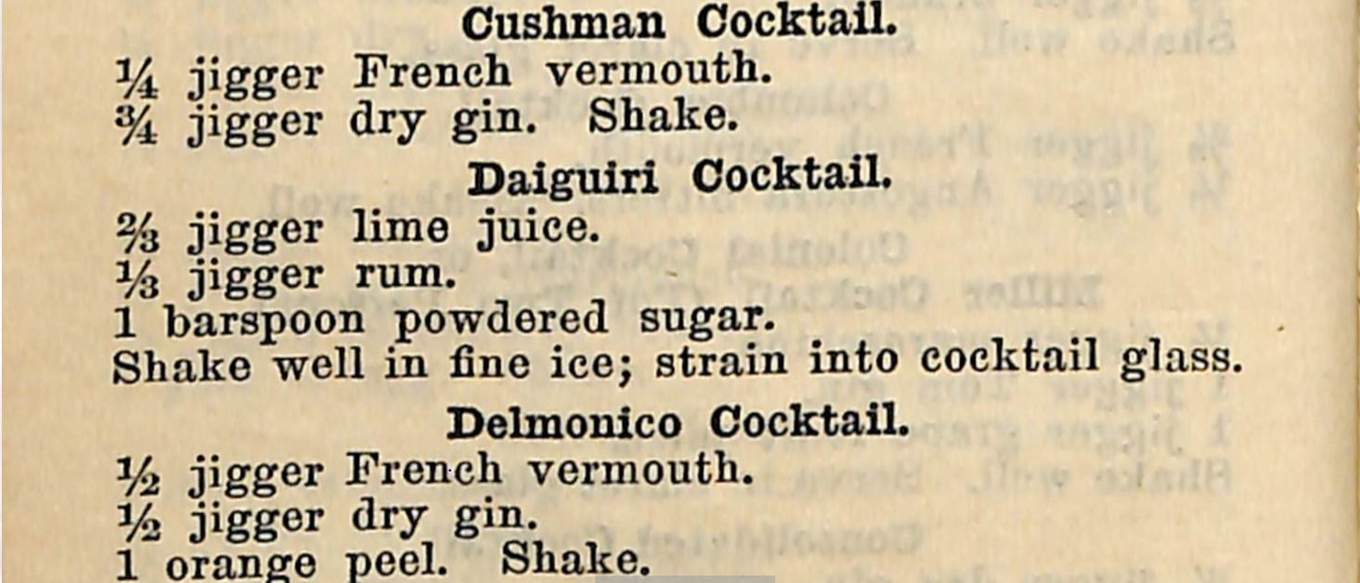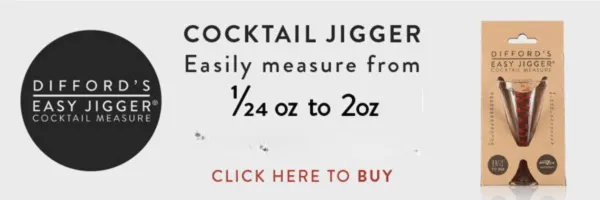

Daiquiri history & story of its creation
Words by Simon Difford
The Daiquiri cocktail is closely related to the Canchanchara, a 19th-century Cuban blend of aquardiente de caña, lime, honey and water, but the creation of the Daiquiri is credited by Jennings Stockton Cox, an American engineer at the turn of the 20th century.
In 1898, after Roosevelt's victory at the Battle of San Juan Hill, the Americans began to exploit Cuba's iron-ore mines and Stockton Cox led one of the initial exploratory expeditions. Cox and his team worked in the Sierra Maestra Mountains on the south-eastern shore of Cuba where the small town of Daiquirí lies and it was while he was there that he created his classic cocktail.

The engineers received substantial salaries and generous tobacco rations, after all, there had to be some inducements for these qualified engineers to leave secure positions in the USA and brave the threat of yellow fever in Cuba. Thankfully, our hero also requested they each received a monthly ration of the local rum, Bacardi Carta Blanca, and noticing that the Cuban workers often mixed Bacardi with water, soda or their evening coffee, he began to experiment himself.
Drinks legend has it that another engineer called Francesco Domenico Pagliuchi was viewing mines in the region and met with Cox. During their meeting, they set about making a drink from the ingredients Cox had to hand: rum, limes and sugar.
Pagliuchi was also a keen scribe and correspondent for Harper's, the American monthly magazine. Hence, in 1948, after an obituary in the newspaper El País stated that a bartender named Emilio "Maragato" González, the deceased, was the inventor of the "Daíquirí", Pagliuchi wrote a letter giving his eye-witness account of the Daiquiri cocktail's creation by Jennings Cox.
Mr. Director of "El País
Francesco Domenico Pagliuchi, 1948
Havana.
Dear Sir:
In your appreciable newspaper "El País", today's afternoon edition, I read an article entitled, "Maragato" died last night, the inventor of the "Daíquirí". Let me clarify that the delicious "Daiquirí" was not invented in Havana, but in the Daiquirí mines, by Engineer Cox, director of those mines and the undersigned.
After the Cuban war of independence, in which I had a very active part, I obtained American capital to reactivate the old copper mines, located near Santiago de Cuba, of which I was the director; While I was busy on this job, I had occasion to go to Daiquiri to speak with Mr. Cox. Concluded the business that took me to Daiquirí, I asked Mr. Cox if he was going to treat me to a cocktail.
On the sideboard in the dining room at the mines, there was neither gin nor vermouth; There was only Bacardi, lemons, sugar and ice. With these elements we made a well-shaken and very cold cocktail that I really liked. So I asked Cox: -And what is this called? He replied: "Rum Sour". In the United States there is a drink called "Whisky Sour", which is made with whiskey, sugar, lemon juice and ice, but I told him: "This name is too long, why not call it a Daiquiri?
Later, we went to Santiago de Cuba; At the "Club Americano" Bar, where there were already a few acquaintances, we ordered a Daiquiri. The Bartender replied that he did not know what it was. Then Cox explained how it's done, recommending beating it until it's served very cold. Some of the friends who were in the Bar also ordered a Daiquiri. Everyone liked it, and very soon this cocktail became popular in Santiago, from where it went to Havana and today it is world famous. The above described is the true version of how the famous "Daiquirí" was invented.
From your attentive S.S.
Engineer P. D. Pagliuchi, Commander of the Cuban Liberation Army

Jennings Cox
Evidence confirming Jennings Cox as at least having named the Daiquiri, appears on page 38 of Basil Woon's 1928 book, When it's Cocktail Time in Cuba. He says that this drink was popular with a group who used to meet in Santiago's Venus bar every morning at eight o'clock.
The boys used to have three or four every morning...
...Most of them worked in the Daiquiri mines, the superintendent of which was a gentleman named Cox – Jennings Cox. One morning in the Venus bar Cox said: "Boys, we've been drinking this delicious little drink for some time, but we've never named it. Let's christen it now!"
Basil Woon, When it's Cocktail Time in Cuba, 1928
The boys milled around a bit and finally Cox said: "I'll tell you what, lads – we all work at Daïquiri and we all drank this drink first there. Let's call it a daïquiri!"
The daiquiri is now the best-known drink in Cuba. This recipe for the real daiquiri was given me by Facundo Bacardi and confirmed by one of the mean who was present at the christening: half one lime, squeezed onto one teaspoon of sugar; pour in one whiskey-glass full of Bacardi, plenty of ice; shake until shaker is thoroughly frosted outside. Meanwhile, chill a tall wine-glass of the kind known a flute, fill it with shaven ice, and pour in the mixture. Must be drunk frozen or is not good.

A handwritten Daiquiri recipe, said to be by Jennings Cox, from his granddaughter's archive. ("Original Mr. Cox's" top right, appears to be a later notation.)
US Admiral Lucius Johnson fought in the Spanish-American war of 1898 visited Jennings Cox in Daiquirí during 1909 and later recounted their meeting and his enjoying one of Cox's Daiquiris in the Baltimore Sun. The Daiquiri travelled back to America with the admiral who introduced the cocktail to the Army & Navy Club in Washington D.C. and a plaque in the club's Daiquiri Lounge records his place in cocktail history.
The earliest appearance of Daiquiri in a cocktail recipe book is in Jacques Straub's 1914 book Drinks where it is misspelt "Daiguiri".

Jacques Straub's Drinks 1914




Daiquiri Cocktail
Crisp, light and refreshing. Delicately simple yet with perfectly balanced complexity of flavours. For an even better Daiquiri: In place of sugar syrup,

Daiquiri (frozen)
A superbly refreshing cocktail on a hot day. Blend with too much ice and you will have a tasteless slushy drink that will give you brain-ache if you drink

Daiquiri Frappé
Not to be confused with a Frozen Daiquiri, which is blended with crushed ice, a Daiquiri served frappé is shaken with cubed ice and then strained over

Daiquiri (on-the-rocks)
Light and refreshing. No one flavour predominates - sweet and sour are in harmony with the rum.





